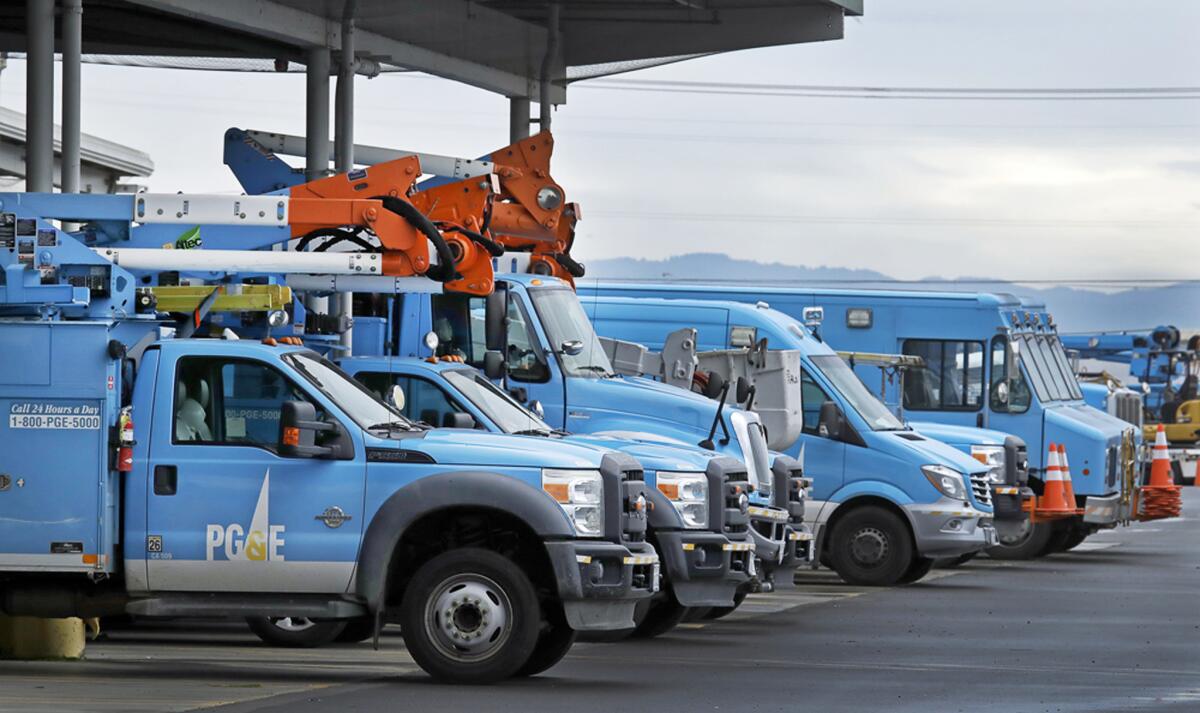PG&E plans to pay its $4-million fine for involuntary manslaughter out of fire victims fund

- Share via
Pacific Gas & Electric, the utility that has pleaded guilty to 84 counts of involuntary manslaughter for the 2018 Camp fire, plans to pay its $4-million fine from a fund set aside for victims of the blaze.
The utility is on the hook for $3.5 million in fines and penalties and an additional $500,000 that will go to the Butte County District Attorney’s Environmental and Consumer Protection Fund as part of a plea agreement the utility recently reported to the Securities and Exchange Commission.
The utility plans to pay that $4 million out of a $13.5-billion Fire Victim Trust that was set up during its bankruptcy after the wildfire, which killed 85 people and destroyed more than 18,000 buildings in the rural mountain town of Paradise in Northern California.
“This is an unconscionable attempt to avoid responsibility for the very crime to which it just confessed,” said Michael Carlson of Caymus Vineyards, one of thousands of claimants against the utility. “The district attorney worked hard to hold PG&E responsible for its crime, and we are confident he never intended for PG&E to use funds dedicated to fire victims.”
Indeed, Butte County Dist. Atty. Michael Ramsey told The Times on Thursday he was surprised when he learned of the utility’s payment plan.
“It’s incredibly stupid and insenisitve, in a nutshell,” Ramsey said. “All these statements of ‘great remorse.’ Is that all fake?”
But Ramsey acknowledged he does not have the power to tell the utility how to pay its fine. That will be up to the judge overseeing the utility’s bankruptcy. Observers such as Paradise Councilman Michael Zuccolillo have already made up their minds on how the judge should rule.
“It’s a fine against PG&E, it’s not a fine against the wildfire fund,” said the councilman, who like most of the town’s residents lost his home in the 2018 blaze. “I think it’s extremely poor PR. I have a hard time imagining PG&E can’t come up with $4 million.”
PG&E officials argued that when the trust was established, all parties agreed to use the fund to pay out claims against the utility. Fines and penalties is mentioned in the fine print once, on the third page of the agreement’s term sheet.
To undo this specific portion of the agreement could throw PG&E’s entire bankruptcy plan into jeopardy, including its financing, the company said in a statement emailed to The Times on Thursday.
“The action we took this week related to the Camp fire charges is an important step in taking responsibility for the past and working to create a better future for all concerned,” the company statement said. “We want to do right by the victims and the communities. That is why we have been focused on resolving the cases quickly so that victims can start to receive the help they need as quickly as possible.”
Earlier this month, it appeared that the victim trust could be tapped by both the California Office of Emergency Services and the Federal Emergency Management Agency to recover costs from their responses to the fire as well. Both agencies have since agreed that victims will receive their payments out of the trust first.
The fine and settlement PG&E reached with Butte County prosecutors included the caveat that prosecutors cannot seek additional charges against the utility for the Camp fire, which shattered California records for lives lost, buildings destroyed and insurance claims filed for a single wildfire.
Investigators found that PG&E workers had failed to do climbing inspections on many of its grid towers, including the century-old tower where equipment failed the morning of Nov. 8, 2018. On that day, a small metal hook holding up a high-voltage transmission line and insulator failed, creating the spark that ultimately grew into the wind-driven blaze.
This was not the first time PG&E had been found criminally responsible for a disaster.
In 2016, a federal jury found the utility guilty of violating pipeline safety regulations before a deadly natural gas pipeline explosion in the San Francisco Bay Area and then misleading investigators about how it was identifying high-risk pipelines.
Jurors convicted PG&E of obstruction and five of 11 counts of pipeline safety violations, including failing to gather information to evaluate potential gas line threats and deliberately not classifying a gas line as high risk.
The explosion of the PG&E natural gas pipeline in 2010 sent a giant plume of fire into the air, killed eight people and destroyed 38 homes in the city of San Bruno.
More to Read
Sign up for Essential California
The most important California stories and recommendations in your inbox every morning.
You may occasionally receive promotional content from the Los Angeles Times.











